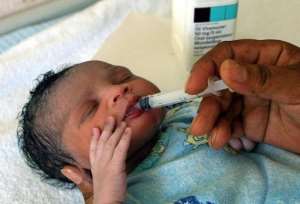
JOHANNESBURG (AFP) - About 117,000 babies were saved from HIV infection last year under South Africa's scheme to prevent mothers from passing on the disease during childbirth, health official said Thursday.
Among mothers with HIV, only 2.7 percent passed the virus to their babies in 2011, down from 3.5 percent in 2010, the Medical Research Council said. The rate was eight percent in 2008.
Health Minister Aaron Motsoaledi told a news conference that the reduction proved the success of the government's programme which gives pregnant women drugs that reduce the chance of their babies catching the virus.
"These results, if sustained, will make a major contribution to our efforts to decrease" deaths of infants and young children, Motsoaledi said.
He added that the anti-retroviral drugs also make it safe for HIV-positive mothers to breast feed their babies.
The medicines reduce the viral load in a mother's body, which in turn reduces the infant's risk of contracting HIV through the umbilical chord or by exposure to the mother's bodily fluids during childbirth or breast feeding.
The newborn also gets a few drops of ARV syrup as an extra boost to fight infection.
South Africa has the world's largest HIV caseload, with six million people currently living with the virus. After years of refusing to roll out drugs, the country now runs the world's largest treatment programme, serving 1.3 million people.




 We’ll no longer tolerate your empty, unwarranted attacks – TUC blasts Prof Adei
We’ll no longer tolerate your empty, unwarranted attacks – TUC blasts Prof Adei
 Bawumia donates GHc200,000 to support Madina fire victims
Bawumia donates GHc200,000 to support Madina fire victims
 IMF to disburse US$360million third tranche to Ghana without creditors MoU
IMF to disburse US$360million third tranche to Ghana without creditors MoU
 Truck owner share insights into train collision incident
Truck owner share insights into train collision incident
 Paramount chief of Bassare Traditional Area passes on
Paramount chief of Bassare Traditional Area passes on
 Two teachers in court over alleged illegal possession of BECE papers
Two teachers in court over alleged illegal possession of BECE papers
 Sunyani: Victim allegedly shot by traditional warriors appeals for justice
Sunyani: Victim allegedly shot by traditional warriors appeals for justice
 Mahama vows to scrap teacher licensure exams, review Free SHS policy
Mahama vows to scrap teacher licensure exams, review Free SHS policy
 Government will replace burnt Madina shops with a new three-story, 120-store fac...
Government will replace burnt Madina shops with a new three-story, 120-store fac...
